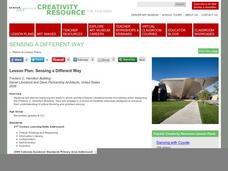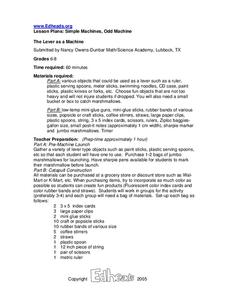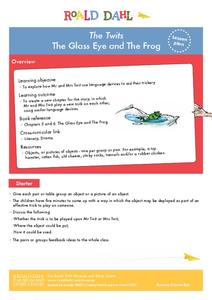Curated OER
Name That Object
Need a sponge activity? This is a simple game-like activity that can be completed in 5 to 10 minutes and helps young learners practice question asking and reasoning skills. The teacher hides a common classroom object from the class and...
Creative Educator
Fantastic Fractions
Groups of learners create an animation illustrating fractions using common objects. They choose everyday objects that they can divide into fractions. They take pictures of the objects dividing into fractions and create an animation with...
Curated OER
Lesson: Allison Smith: What Are You Fighting For?
Trench art is a nontraditional art form created by soldiers in trenches during wartime. Artist Allison Smith connects her art to the American Revolution and the question: "What are you fighting for?" Kids examine her art, how it connects...
Curated OER
Lesson: Sensing a Different Way
Problem solving and creative thinking are top priority in an interesting lesson. Learners explore how they can think creatively to use four common objects in three different ways, they discuss senses and using senses differently to...
Benjamin Franklin Tercentenary
Simple Machines, Ben Franklin and the Technology of the 1700s
Benjamin Franklin was an inventor, and he was fascinated by the mechanics of machinery. Using a fun exploration, pupils examine simple machines from the pre-Industrial era. Then, they must identify and build their own using common objects.
Curated OER
Garden Scavenger Hunt
Second graders examine the metric system. In this metric system lesson, 2nd graders compare measurements of common objects in metric units. Students compete in a garden scavenger hunt.
Curated OER
Music in the Common Schools
Students sing songs from the common schools era and compare music from the common schools era and today. In this music lesson plan, students look at pictures, fill out Venn Diagrams, and listen to music.
Teach Engineering
Scale Model Project
Try your hand at scale models. Scholars create a scale model of an object using a scale factor of their choice. As part of the project, they give presentations on their processes and calculations. This is the last installment of the...
Curated OER
What Came From Where?
Young scholars research patterns and networks of economic interdependence. They work cooperatively to create 3-dimensional representations of common objects and charts describing the objects' components and countries of origin. Students...
Curated OER
Proportionality Using Wind in the Willows
Students examine proportionality in Wind in the Willows by comparing Mr. Toad, objects proportional to him and objects proportional to humans. They then measure a stuffed Mr. Toad and make common objects proportional to Mr. Toad???s...
Curated OER
Every Object Tells a Story
High schoolers read the story behind objects in the Cooper-Hewitt National Design Museum and create a story about an object in the exhibit. In this design lesson, students explore the "Design for the Other 90%" exhibition and create a...
Curated OER
Simple Machines, Odd Machines
Students recognize and identify common objects that can be used as a lever. In this simple machines instructional activity, students experiment with materials to design and construct a machine that uses a lever. Students also design and...
Curated OER
Decorating Objects... and Re-decorating
Students create decorative objects and discuss their importance in form and function. In this art history lesson, students discuss Chinese porcelain objects with mounts later added by the Chinese. Students recreate an example of this art...
Curated OER
Cloudy With a Chance of Meatballs
Fourth graders participate in an activity which introduces them to common types of precipitation. They examine "Cloudy With a Chance of Meatballs" through a teacher read aloud and make a weather pamphlet.
Curated OER
Growing Pains
Learners compare common food items with the parts of a plant. They grow their own plants to assess the difficulties in assisting a plant's growth and reproduction.
Curated OER
The Five Senses
Study various objects and help kindergarteners use their five senses to classify the objects. They are presented with various objects and then use their five senses to sort and classify the objects. Then they use a Visual Ranking Tool to...
Curated OER
Rockin' Rhythm Band
Pupils use ordinary objects to create rhythmic sounds and rhythms. They use such things as sandpaper, rubber bands, and pencils to follow teacher rhythms.
Curated OER
Safe Pets, Safe Kids
Students explore the concept of pet safety. In this pet safety instructional activity, students discuss dangerous objects and settings for humans and pets. Students find or draw pictures of these objects/settings and create a...
Curated OER
Allowing Students to Explore Simple Physics and Marketing in English Class
Scientific method, linear measurements, friction, inertia. Imagine learning scientific vocabulary in an ELA class. Before researching and developing a presentation about simple machines, class members build a common, but decidedly...
Roald Dahl
The Twits - The Glass Eye and the Frog
What do a pair of stinky socks and a toy hamster have in common? The third instructional activity in an 11-part unit designed to accompany The Twits by Roald Dahl uses silly objects to teach about figurative language. Zany pranks...
Curated OER
Character Nichos
This art lesson also incorporates a study Mexican and South American cultures and art. Students then create Nichos, which are small, decorated boxes commonly found in homes and public places, or displayed on walls or pedestals.
Curated OER
Chasing Metaphors
Students use metaphors in order to see commonly experienced objects, events, and people in new and more meaningful ways.
Creative Educator
Dream Room Design
Junior designers brainstorm the elements that a bedroom might have, such as a bed, television, and dresser. They identify which items are needs and which are desires. They practice measurement skills in the classroom by determining its...
Curated OER
Understanding Symmetry Through Visual Art
Have your class explore symmetry, radial balance and fractional parts in natural and man-made objects in their environment. Learners list examples and identify symmetrical and asymmetrical designs. Pupils are given a box of crayons and...























